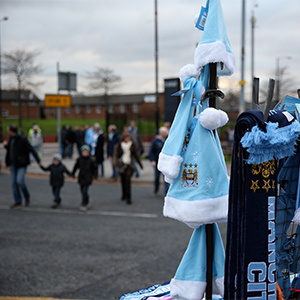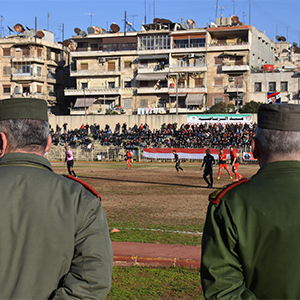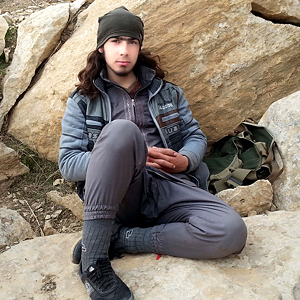The Premier League is 25 years old on 15 August 2017.
To mark the anniversary, BBC Sport has produced five pieces, each covering a five-year period in the competition's history.
This is the second piece, focusing on the span from 1997-98 to the end of the 2001-02 campaign.
Scroll down for written insight, a visual timeline, Mark Lawrenson's team of the era, a tailored tactics board and tables, before testing yourself with our Merlin sticker quiz.
Five years on from its initiation, the Premier League finally had a rivalry to define it.
From 1992 to 1997, Manchester United had won their four championships by a total of 29 points. The only team to break their grip, Blackburn Rovers, finished the following season seventh.
Now, with Arsene Wenger established at Highbury and talented compatriots - such as Patrick Vieira, Nicolas Anelka and Emmanuel Petit - flooding in with him, Alex Ferguson no longer had it all his own way. United would lose the title to Arsenal by a point in 1998 and win it back by the same margin in 1999. The two clubs would finish in the top two places in four successive years.
Both men spent significant amounts of money in the transfer market, although it would be the relative bargains that sealed their greatest triumphs: Anelka, bought for £500,000 and sold for £22m, scoring the goal that sealed the 1998 Double, Arsenal's first in 27 years; Ole Gunnar Solskjaer, picked up for £1.5m, turning in the late, late goal that won United the 1999 Champions League final and an unprecedented Treble.
There were rivalries within the rivalry - not least Roy Keane v Vieira - but the model of the two managers was not dissimilar: a bedrock of British talent, a dominant goalkeeper, a midfield that mixed grace with menace and the sort of pace up front that no-one else could match.

The enforcers - clashes between Keane (left) and Vieira (right) epitomised the fierce rivalry between Manchester United and Arsenal
If Ferguson could be considered fortunate to have David Beckham, Paul Scholes, Nicky Butt and the Neville brothers all maturing together, and Wenger was lucky to inherit a defence built around Tony Adams, Steve Bould, Lee Dixon and Nigel Winterburn, both men maximised the gifts at their disposal. And neither was quite as blessed as Petit, who in the space of two months won the Double with Arsenal, scored the final goal as France won the World Cup on home soil and then bagged £17,000 on a fruit machine in a Monte Carlo hotel. He gave the last of those prizes to charity.
Not all were so fortuitous. Tottenham's attempt to ape their rivals with a foreign maverick manager of their own began with Christian Gross waving a Travelcard and ended with him waving goodbye nine ugly months later. The gap between haves and have-lesses was becoming starker with every season; all three of the promoted teams in 1997 were relegated a year later.
Money was changing the game and changing players' outlooks. Somewhere in the mid-1990s, footballers stopped collecting the greatest hits of Phil Collins and Rod Stewart, and started getting into the sort of music most men of their age liked.
While some stayed traditional (David Unsworth and his love of John Secada), you could go to the house of David James and be shown his Technics decks, even if he seldom used them. Nottingham Forest striker Paul McGregor formed a Britpop band called Merc. Michael Duberry would eulogise about the beats and voice of R&B producer Keith Sweat.
Early in the Premier League's lifespan, Nottingham Forest midfielder Ian Woan had spent his summer break with his wife in her native USA. When two team-mates had joined them on the beach in old-fashioned 1980s-style swimming trunks, the Americans wearing board shorts and Bermudas had looked on in astonishment.
By the late 1990s, footballers had gone from such fashion faux-pas to the catwalks. Dean Holdsworth modelled for Topman, his Wimbledon team-mate Stewart Castledine for DKNY, even if Chris Perry and Peter Fear did not get the call. Robbie Savage got a tattoo of the Armani logo. He has now had it removed.
Glamour came to unlikely places. Bolton, who had started the decade at a ground old enough to have featured in a Lowry painting and low-key enough to have a supermarket behind one of the goals, saw global superstars such as Jay-Jay Okocha, Ivan Campo and Youri Djorkaeff strutting around their new 29,000 all-seater Reebok Stadium.
Not all overseas signings were such a success. While the big wages and high hopes of Premier League owners had already seen Andrea Silenzi and Tomas Brolin stink out Forest and Leeds respectively, the flops kept coming as the money piled up.

Before Zola, Di Canio and Vialli there was Andrea Silenzi - the first Italian to play in the Premier League
Spurs chairman Alan Sugar called them "Carlos Kickaballs". Blackburn fans had other names for Corrado Grabbi, Aston Villa supporters choice words for Bosko Balaban.
Some big names arrived and then never appeared, defender Winston Bogarde emblematic of a new sort of ambition: earning as much as you could while training and playing only for the reserves.
Big names began to fall. Manchester City dropped to the third tier, Forest to the second. Sheffield Wednesday sank, yet to return, and Leeds - Peter Ridsdale's rented goldfish and all - were beginning a precipitous decline that would take them from the semi-finals of the Champions League towards insolvency.
The audience was changing too, moving upmarket, getting older, becoming more corporate. Keane talked darkly of the prawn sandwich brigade. Players’ lifestyles moved with the times: the end of the old Tuesday Club at Arsenal, when the team would turn up for training in suits, the quicker to be out on the town later that day and filling their boots with beer; the disgust on Paolo di Canio’s face when the West Ham coach stopped off at a fish and chip shop on the way back south from an evening kick-off.
The more significant move at Old Trafford came in 2002, when Ferguson changed his mind about retirement and signed on for more. If it was bad news for some of his players, it was worse yet for the club's rivals. Ferguson was only just getting started.

20 November 1997: Eyebrows are raised when Tottenham appoint Christian Gross to replace Gerry Francis, and the former Grasshoppers boss raises a smile when he arrives at his unveiling by underground, holds up his Travelcard and tells fans: “I want this to become my ticket to the dreams!” Spurs lose 6-1 to Chelsea in his second home game in charge and he is sacked three games into the next season.

17 January 1998: Georgian striker Temuri Ketsbaia produces the Premier League’s angriest celebration when he removes his shirt and kicks the advertising boards after scoring a late winner in Newcastle’s 2-1 victory over Bolton Wanderers.

14 March 1998: Manchester United entered March 11 points clear at the top of the Premier League, with their nearest contenders Arsenal having three games in hand. A solitary Marc Overmars goal sees Arsenal beat United at Old Trafford to swing the title race back in the Gunners' favour. Arsene Wenger's side go on to win the Double.

20 August 1998: Manchester United pay a club record £12.6m for Aston Villa striker Dwight Yorke. Yorke had demanded the transfer, with Aston Villa boss John Gregory saying: "If I had had a gun I would have shot him." Alex Ferguson had spotted something in Yorke, who plays his best football in tandem with fellow striker Andy Cole as United go on to win the Treble.
26 September 1998: Sheffield Wednesday striker Paolo di Canio reacts very badly to being shown a red card in a home fixture with Arsenal by pushing referee Paul Alcock. The official makes the moment even more memorable by tumbling comically to the turf. Italian Di Canio is fined £10,000 and banned for 11 games.

2 August 1999: Arsenal sell French striker Nicolas Anelka to Real Madrid for £22.3m - the highest fee involving a British club at the time. A day later, they re-invest £11m of that in Thierry Henry. It is a good move as Henry goes on to score 175 league goals for the Gunners.

17 November 1999: Arsenal announce plans to move to a new 60,000-seat stadium at Ashburton Grove, near Highbury - their home since 1913. The Gunners move into Emirates Stadium in 2006.

6 May 2000: Striker Kevin Phillips scores 30 league goals for Sunderland as they finish seventh in the Premier League. Phillips is the first, and remains the only, English player to win the European Golden Shoe award for the top scorer in Europe.

9 November 2000: Manchester United captain Roy Keane hits out at sections of the club's support for the poor home atmosphere they produce. “They have a few drinks and probably the prawn sandwiches, and they don't realise what's going on out on the pitch," he says. His mood is brightened as United claim a third straight title the following May.

23 November 2000: Leeds break the English transfer record by paying £18m for West Ham centre-back Rio Ferdinand. The England international would make another record move in July 2002, joining Manchester United for £29.1m.
16 December 2000: Paolo's redemption. Now a West Ham player, Di Canio catches the ball in the Everton box to end a Hammers attack after Toffees goalkeeper Paul Gerrard is grounded outside the box by an injury. The gesture, coming 811 days after the Italian's push on referee Alcock earns him Fifa's fair play award.

1 April 2001: Roy Keane deliberately fouls and inflicts a knee injury on Alf Inge Haaland in the Manchester derby. The injury ultimately ends Haaland’s career. Keane later admits in his autobiography that the foul was revenge for Haaland claiming Keane was faking injury when the Manchester United skipper damaged his cruciate ligament tackling the Norwegian in 1997.

3 July 2001: England defender Sol Campbell leaves Tottenham and crosses north London to join Arsenal on a free transfer after his Spurs contract expires. Tottenham fans react angrily towards Campbell, who goes on to win two Premier League titles and three FA Cups at the Gunners before moving to Portsmouth in 2006.

28 February 2002: Sir Alex Ferguson changes his mind about retiring as Manchester United manager at the end of the season and signs a new contract which will keep him at the club for at least another three seasons. United finish the season in third as Arsenal take the title.

12 July 2001: Argentina midfielder Juan Sebastian Veron joins Manchester United for a British record fee of £28.1m. Veron is a disappointment during his two years at Old Trafford before he leaves to join Chelsea in 2003.
























